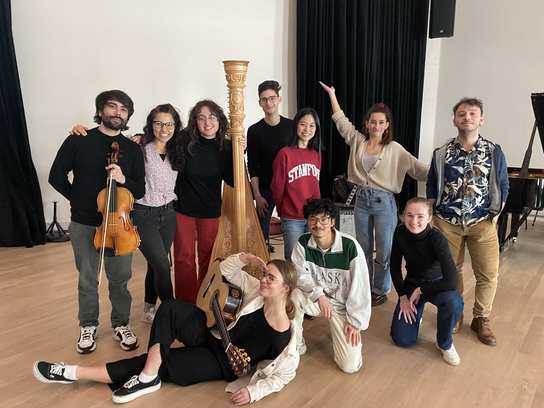The experience of working outside of the comfort zone, outside the safe boundaries of the own genre, is valuable to the artistic development of all music students. It opens their artistic horizons and strengthens their autonomy, flexibility and creativity. Skills that are needed more than ever in the quickly changing music and cultural business of today.
Crossing these borders of the personal comfort zone, of the musical territory, of the own department within the conservatoire, usually is a process that differs for every single student. For the one exaggerating variations on existing material is a huge step already, while for another all kinds of improvisations are comfortable but maybe performing theatric elements on stage would be crossing a line. This depends on experience, the own genre and personality.
But one thing is for sure: Within the student community a perceived need of artistic exchange and cross-genre playgrounds is present.
What should these open and creative spaces look like, that ideally offer freedom for artistic collaboration, inspiration and creation between music students? Though they are still rare in conservatoires, students, coming from several departments, seem to show a deep interest in creative activities based on collaborating with and learning from peers from other genres and departments.
Still, there are many obstacles occurring like busy schedules, the fear of the unknown or the fear of improvisation. The models and the communication around these projects need to be more accurate, directed, inviting and stimulating.
But what do students desire exactly when it comes to content or to guidance? And how should the study offer, also in terms of length and intensity, look like?
To find out, different models and formats of cross-genre activities might need to be designed and tested in order to reach and appeal to as many students as possible, the more experienced and daring ones, as well as the less adventurous, skeptical and/or inexperienced ones.
This research investigates formats of inter-departmental cross-genre activities and their impact on conservatoire students' motivation, creativity and artistry. By conducting and analyzing a series of case studies around creative semi-formal student-centered projects, next to collecting data from a number of surveys, the aim is to obtain more insights in the opportunities offered by cross-genre activities, but also into what desires and motivations students have around this topic and what challenges lie in the feasibility of various concepts that are offered already.
“[…] I find this kind of interdisciplinary event very important for an institution like KonCon. It’s effective on so many fronts: connecting departments and their idioms, allowing people to put their own practice into perspective, letting go of all knowledge and just making music intuitively, making friendships, collaboration, the list goes on. Also, […], the constructive critique sessions were very good for learning to communicate your experience to others, rather than giving a biased opinion. That should be a mandatory skill to learn at the conservatoire.”
PARTICIPANTS' QUOTE

